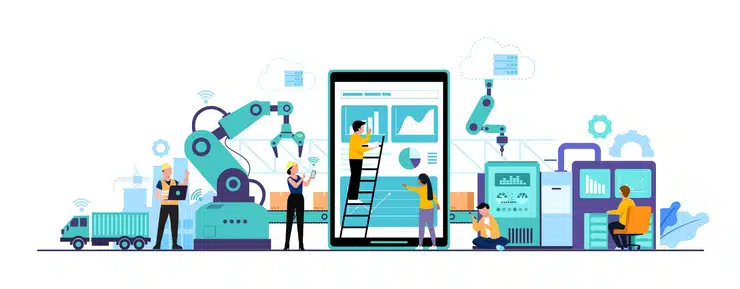How Will Artificial Intelligence Help Good Managers Become Great?

Introduction – Adaptation and Evolution of AI in Management
Several businesses use Machine Learning and Artificial Intelligence in management. The most significant AI tools are based on a vast amount of data, recognizing patterns, learning from them, and making definitive predictions. AI is becoming popular in project management because of its exceptional capacity to track particular trends and predict project situations and results.
Modern IT and technology applications are no longer the only ones using Artificial Intelligence (AI). Project Managers are among the roles that AI has already started to take over in more conventional contexts to supplement or replace. Administrative chores are already using AI in management through automation, including keeping records and logs, scheduling meetings, emailing invitations, creating agendas, and taking minutes at meetings.
It will eventually become more capable of managing more complex project management duties. The potential applications of Artificial Intelligence in management are virtually limitless. The following are some instances of AI in management roles:
- Automating administrative processes, such as data entry or meeting scheduling
- Screening resumes of job seekers and updating those who have applied
- Utilizing chatbots to enhance customer service
- Based on consumer behavior, making product suggestions
- Gathering and evaluating customer and employee feedback
- Automated software for fraud threat detection and response
- Predicting the state of the supply chain
You may establish streamlined, effective processes that provide your organization a competitive edge by integrating AI in management via various elements of your operations. Machine learning and Artificial Intelligence in management can simplify your job. For instance, you can use AI in management to make more data-driven decisions for your team or automate some of your more time-consuming tasks.
However, AI systems were originally referred to as expert systems. They made it possible for more people to perform most activities expertly. They increased users’ potential and changed the business’s overall performance curve. Experts could concentrate on the most difficult jobs that only AI-based systems could handle.
But there were several obstacles in the way. Although they would tackle older problems as efficiently as possible, models tended to trail changes in the business and eventually grew stale. Both the use and maintenance of such systems needed specialized personnel. Let’s learn more about the role of AI in management under the following sub-headings.
How Is AI Helping Managers in Management?
Artificial Intelligence in Management has a wide range of commercial uses, from enhancing interactions with clients and staff to seeing patterns in massive amounts of data. Most managers should greatly benefit from these because they will have more time to concentrate on how they offer value to their organizations. The secret is to seize the chance that business-related Artificial Intelligence presents for individual and organizational success, including scaling your impact and your skill set.
-
Enabling Data-driven Management
AI is better than humans at crunching numbers, finding patterns, and making quick decisions based on facts. This Artificial Intelligence program can be a crucial tool for any manager searching for some quantitative support in their decision-making because of its capacity to process enormous volumes of data and spit out-trend directions and useful recommendations.
In fact, since Robo-advisors have replaced human fund managers, 40% of expected job losses in the financial services sector will be in the money management sector. That might seem like awful news, but for those who look for the bright side, it’s not. It is now necessary to upgrade your abilities to fully benefit from richer, faster data, particularly if most of your current time is spent gathering, sorting, synthesizing, and reporting data to detect risks, issues, and status.
How quickly could you achieve results, how would you manage your time, and what skills would you need if you spent no time on these fundamental information tasks? You may adjust and enhance your career prospects and contribution to the firm by learning how to work with AI in management and utilizing its guidance.
-
Setting Better OKRs, Getting Better Results
A framework for defining goals called OKR (short for “Objectives and Key Results”) is used by businesses to identify, coordinate, and carry out their desired results. Key Results are the benchmarks that teams use to gauge progress toward the company’s strategic goals, while Objectives are the lofty ambitions that teams create for future outcomes.
This OKR framework gives all parts of the business a similar language and framework for establishing, coordinating, and achieving intended results.
Effective OKRs provide team members clarity about what they are attempting to accomplish within a particular quarter and how they will assess their progress. This procedure ensures that every company division independently pursues the same goals.
An objective/goal is a declaration of the purpose and direction that an organization or team has in mind. Company goals should specify how the team will get there.
The technology for team-level goal-setting and strategy implementation is called OKR software. They are a perfect implementation of AI in management. Numerous businesses, like Intel, Google, Ford, Walmart, and others, frequently employ advanced OKR tools. Although some teams prefer to simply record their OKRs in static Excel spreadsheets or PowerPoint slides, many forward-thinking businesses use specialized OKR software to record their key Objectives and track their progress against the plan.
-
Picking Up Administrative Slack
A significant portion of any manager’s daily tasks is administrative tasks, which are vital but repetitive and routine and don’t need a lot of talent. For instance, a study by the Harvard Business Review of project managers revealed that 54% of their time was spent on administrative tasks. While that number may be close to that for other managers, it is not working that motivates managers, and it is ideal for AI.
By incorporating Artificial Intelligence into mundane management tasks, managers are better able to concentrate on high-value tasks. For instance, AI for managers can prove beneficial as AI may inform managers when to meet to address risks or blockages.
They can even set up the meeting and include the appropriate people when difficulties arise, create the proper agenda, and follow through on activities. Another example is how the associated press increased its output of quarterly earnings reports from 300 to 4,400 by using AI-powered robots.
-
Raising Your Boss Game
By providing more immediate feedback to team members and enhancing team accountability, AI can assist managers in enhancing team dynamics. AI can highlight who needs further coaching and prepare a fact-filled agenda for a one-on-one meeting between the manager and the employee. It can also highlight who needs positive feedback at the end of the week and notify the management or even offer feedback. Better coaching has several advantages, and 72% of workers believe their performance would increase if they received more feedback. However, many managers lack the time, routine, or information necessary to give timely, fact-based feedback consistently.
Artificial Intelligence in business ultimately improves our leadership and management skills. Imagine it as your chief of staff, anticipating your needs, your next best business move, and the needs of your staff.
Try these five themes in the meeting to connect, calibrate, and coach for more impact:
Begin by asking, “How are you?”: Then pay close attention to the response to establish a personal connection. How do they feel about the way things are going at work? You’ll learn the most important facts during this meeting, so pay close attention.
Find out what is getting in the way and how you may assist: Remove obstacles from their path as soon as possible so they can achieve the desired outcomes. This doesn’t imply taking on their jobs or becoming involved in workplace disputes; rather, it means getting rid of roadblocks outside of their purview that slow them down or hold them back.
Alignment in competence, engagement, and performance: Sincere, reliable calibration is part of your job description because this is the problem that needs to be addressed. Letting individuals know where you believe they are in relation to you may assist them in advancing and performing effectively. Additionally, it offers you a chance to say out loud if someone is truly amazing.
Advance to longer-term objectives: Another crucial aspect of the role of Artificial Intelligence is assisting others in striking a balance between long- and short-term needs. When workloads are heavy, connecting with the wider picture is particularly reviving. Realign priorities so they can feel confident that their time and effort are worthwhile.
Hire a career coach: From here, assist them in moving on to the next level and in developing their competencies. What is the next course of action they can take, and how will you assist them in getting there? Depending on the volume and tempo of your chats, the step will vary in size. If you follow through on the assistance, you’ll be giving. You’ll have a good, long-lasting effect on the person’s career.
Conclusion
Artificial Intelligence helps businesses do certain of their tasks more effectively than humans. Additionally, it guarantees to make fewer mistakes than people and can perform work faster. AI can rapidly give advertisers useful information about the interests of their customers. Additionally, it aids in finding search traffic, results, organic competition, difficulty score, search demand, and other keywords for content managers. To know more about the importance of AI for managers in managing their projects, enroll in the Executive PG Diploma in Management and Artificial Intelligence by UNext. This IIM Indore-certified course offers hands-on experience and a deeper understanding of the need for AI equipped leaders.






